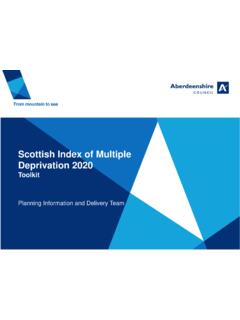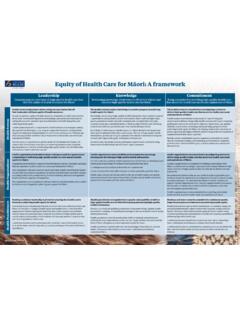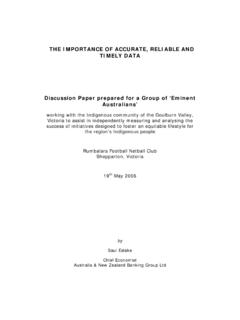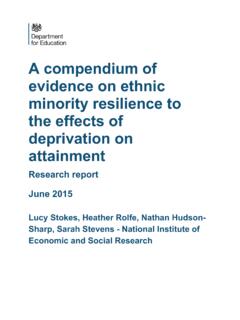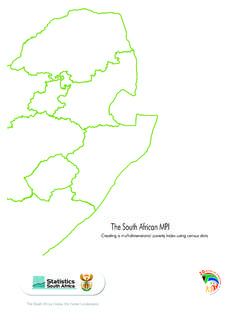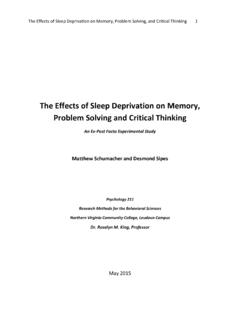Transcription of Strategy for Promoting Mental Health and Wellbeing in ...
1 Strategy for Promoting Mental Health and Wellbeing in Islington Department of Public Health September 2008 Strategy for Promoting Mental Health and Wellbeing in Islington Table of Contents SUMMARY - Promoting Mental Health and Wellbeing in Islington_____4 Introduction the purpose of this strategy_____8 10 reasons why Mental Health promotion matters in Islington_____9 Mental Health and Wellbeing_____10 What is Mental Health ? _____10 What influences Mental Health and Wellbeing ? _____11 Why is Mental Health and Wellbeing important? _____11 Social Exclusion and Mental Health _____11 Mind and Body _____12 Key Messages _____12 Promoting Mental Health and Wellbeing everybody s business_____14 Defining Mental Health Promotion _____14 What is Mental Health Promotion?
2 _____14 Suicide Prevention _____16 What does the promotion of Mental Health and Wellbeing involve? _____16 Mental Health promotion in public policy_____17 Key messages _____18 Reducing risk and Promoting protection_____19 Risk and protective factors for Promoting positive Mental Health and Wellbeing ___19 Risk factors _____19 Protective factors _____20 Key messages _____20 Mental Health need in Islington_____21 Mental Health problems among children and adults in Islington_____21 Characteristics of the borough _____21 Characteristics of the local population _____23 Costs associated with Mental Health problems_____24 Key messages _____25 Reviewing the
3 Evidence_____26 The Effectiveness of Programmes of Mental Health Promotion _____26 Evidence about interventions _____26 Inequalities and Mental Health promotion _____27 Cost effectiveness and Mental Health Promotion _____28 Key messages _____28 Delivering Mental Health promotion our five key objectives_____29 Our Five Key Objectives _____29 Objective 1. Build good Mental Health and Wellbeing in Islington, working in partnership29 Objective 2. Raise awareness about Mental Health _____30 Objective 3. Decrease stigma and discrimination and promote social inclusion for people with Mental Health problems _____30 Objective 4.
4 Encourage people and services to recognise and respond to problems Objective 5. Prevent Suicide _____32 Key Messages _____33 Delivering and evaluating the strategy_____34 A Staged Approach to progressing Mental Health Promotion _____34 Delivery Framework _____37 Evaluation and monitoring _____42 Key messages _____43 Cover: The image on the front cover is a painting by Alan Cooper. Alan created the painting at the Creativity Centre in Islington, which is part of Camden & Islington Mental Health and Social Care Trust. SUMMARY - Promoting Mental Health and Wellbeing in Islington " Mental Health for each person is influenced by experiences in everyday life, in families and school, on streets, and at work.
5 The Mental Health of each person in turn affects the Health of the community." (World Health Organisation, 2004) Our Mental Health is one of the most important and precious resources in life, affecting our personal, social and economic lives and Wellbeing , and deserves to be developed and nurtured. We want to promote better Mental Health in Islington to improve the quality of people s lives and to make the borough a better and healthier place to live for all of our community. To do this, we need to ensure that we plan and provide services that not only treat or respond to needs when people have Mental Health problems, but which help to keep people healthy, promote independence, help people to flourish and fulfil their potential, cope with challenges and contribute to people s sense of Wellbeing .
6 This cannot simply be an NHS task. The opportunity and responsibility for working together to improve Mental Health and Wellbeing needs to be shared across all partners and communities in Islington. Promoting Mental Health and Wellbeing in Islington is a long term Strategy that sets out proposals to transform how we think about and respond to Mental Health needs, emphasising the importance of building and Promoting good Mental Health for everyone within the context of everyday life. What we mean by Mental Health and Wellbeing (Chapter 2) Mental Health is not simply the absence of Mental Health problems, but a much broader concept incorporating positive characteristics that shape the individual and the community.
7 Wellbeing describes the activities and feelings that contribute to a sense of fulfilment, satisfaction with life and a good quality of life. Good Mental Health helps to protect against the risk of Mental Health problems. "There is more to good Health than just a physically healthy body: a healthy person should also have a healthy mind. A person with a healthy mind should be able to solve the various problems faced in life, should enjoy good relations with friends, colleagues at work and family, and should feel spiritually at ease and bring happiness to others in the community.
8 It is these aspects of Health that can be considered as Mental Health ." (Patel 2003). Mental Health promotion (Chapter 3) Mental Health Promotion builds skills and environments that are proven to protect and promote better Mental Health and Wellbeing . It is based on the principle that everyone has Mental Health needs and deserves to be mentally healthy and live life to the full. It helps to: protect against Mental Health problems and prevent suicide tackle the stigma and discrimination associated with Mental Health problems support people, organisations and communities to realise more of their potential and flourish improve a range of social, economic and Health outcomes, and contribute to a greater sense of satisfaction and Wellbeing .
9 Mental Health promotion activities and programmes involve work across the community. Activities and programmes include: Promoting understanding among the wider population of the importance of Mental Health and ways to increase and maintain their Mental Health and Wellbeing , particularly with regard to: o educating people about good Mental Health o how to access help and support, and o building better coping skills and resilience Promoting early access to effective services acting on those social, economic and environmental factors that affect our Mental Health , creating mentally healthy settings in schools, workplaces and neighbourhoods.
10 Factors that can affect Mental Health and Wellbeing (Chapter 4) Mental Health promotion interventions are designed to improve Mental Health and other Health , social and economic outcomes by: reducing or minimising risk factors that may adversely affect Mental Health Promoting protective factors that build and enhance good Mental Health . As the box below shows, factors relate to individuals, households, communities and society as a whole. Risk factors include: Protective factors include: Recent adverse or challenging life event Family conflict Inconsistent parenting Marital instability Overcrowding Friend(s) engaging in problem behaviours Low attachment to one s community, school, family and workplace Alcohol and drug use, including parental misuse for children Discrimination, including racism, homophobia and ageism Social exclusion deprivation and unemployment Poor diet, smoking Past history of Mental ill Health ; traumatic experiences Work-life imbalance.


